“Zinc is a major player in the creation of DNA, growth of cells, building proteins, healing damaged tissue, and supporting a healthy immune system.” — Harvard School of Public Health
Zinc is an essential trace mineral that is vital for many functions in the body, especially in the immune system and the brain. As it turns out, zinc is also needed for collagen to work properly.
Zinc and the Immune System
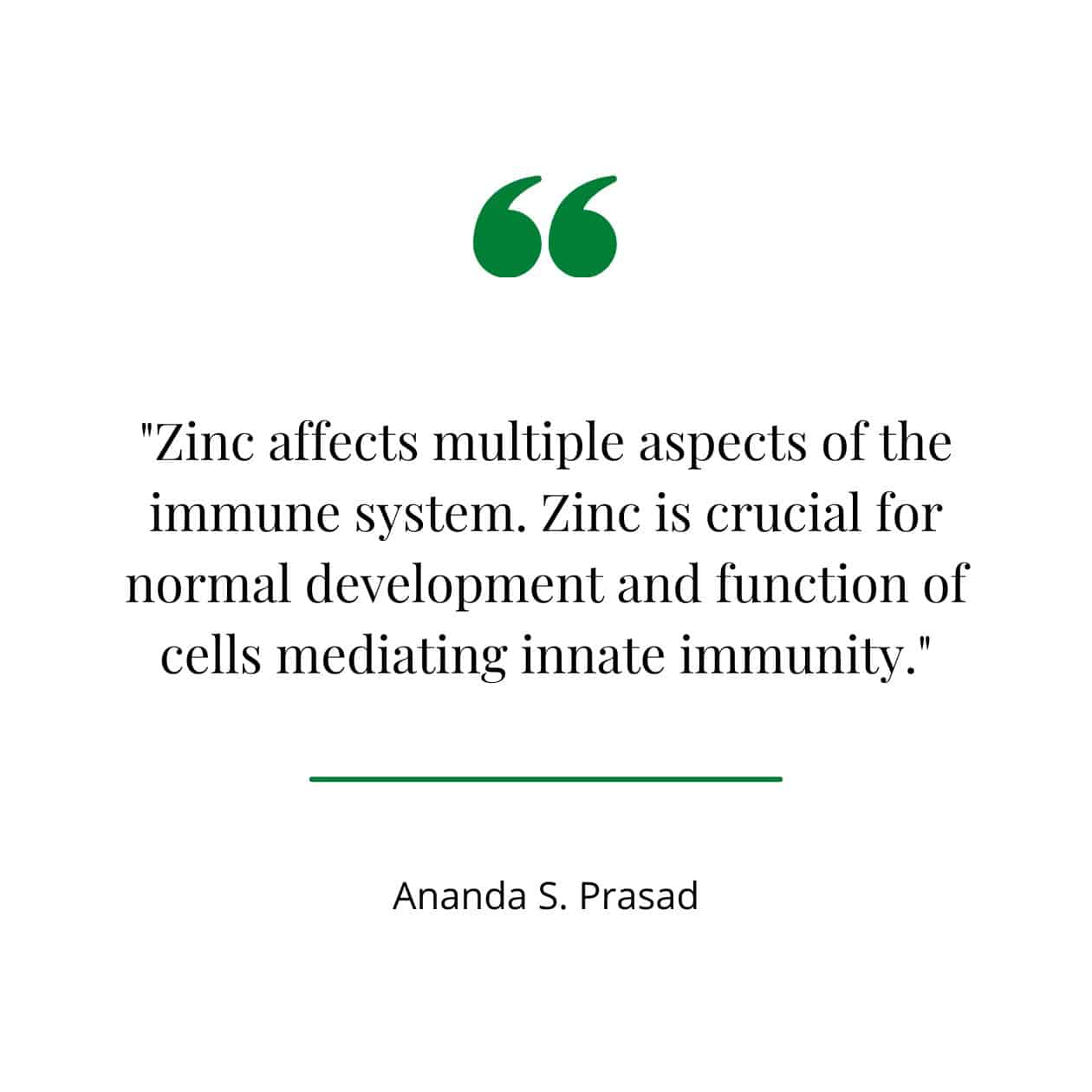
Image Source: Zinc in Human Health: Effect of Zinc on Immune Cells
Zinc is a “trace mineral,” which means it is a micronutrient that is vital for healthy function of the body. It helps to keep a type of white blood cell known as “T cells” working properly and proliferating [1], which is vital to immune function. Zinc assists in enzyme activation, cell division, heart health, and even some metabolic functions, such as balancing blood sugar.
Growing bodies need zinc. This means that pregnant women and children require sufficient zinc in their diet every day. Zinc is also important for the brain. For example, it helps maintain a healthy sense of smell and taste. Many people reach for zinc when they feel a cold coming on, and for a good reason. Zinc is such a great support to the immune system that a clinical trial conducted by Wayne State University School of Medicine and published in the American Journal of Clinical Nutrition [2] found that those who took zinc had fewer infections overall after 12 months.
Many people reach for zinc when they feel a cold coming on, and for a good reason. Zinc is such a great support to the immune system that a clinical trial conducted by Wayne State University School of Medicine and published in the American Journal of Clinical Nutrition [2] found that those who took zinc had fewer infections overall after 12 months.
This study also discovered that zinc could lower IGF-1 levels. IGF-I stands for Insulin-like Growth Factor and high levels are connected to cancer risk [3]. In the same vein, researchers involved in a 2017 study at the University of Texas at Arlington found that zinc can “significantly inhibit the proliferation of … cancer cells [4].”
Zinc Is Needed for Collagen Synthesis
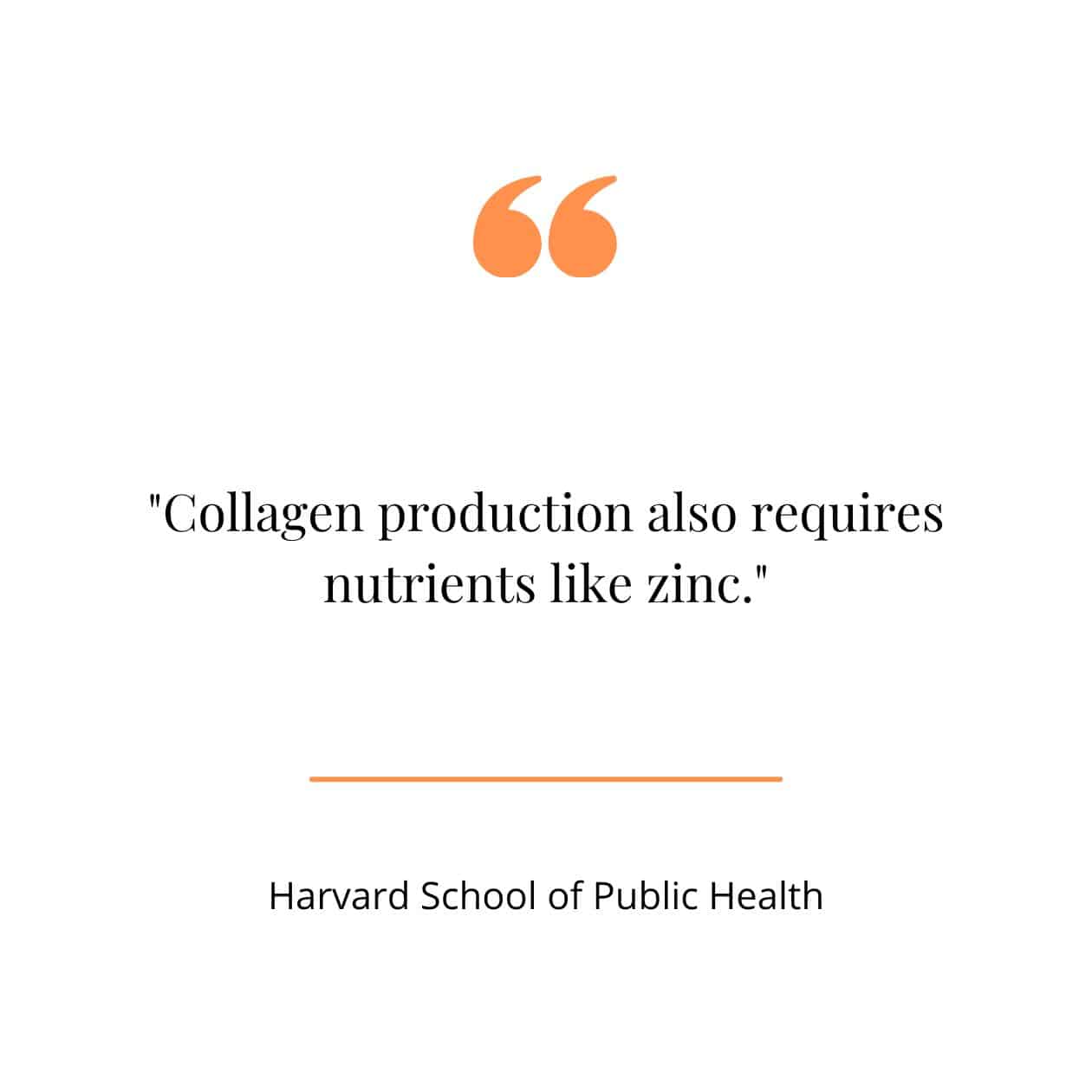
Image Source: Collagen | The Nutrition Source
With all these benefits that zinc offers the body, it’s difficult to imagine that it could possibly do more. It can, however, especially when it comes to collagen. Zinc is what is called a “co-factor” for the production of collagen. This means that its job is to “activate” certain other proteins that are vital for collagen synthesis.
If you’re not familiar with the term “collagen synthesis,” a report published in the Journal of Investigative Dermatology refers to collagen synthesis as “a complex orchestration of intracellular and extracellular events [5]” that leads to collagen production, usually aided by enzymes in the body.
Basically, without certain key micronutrients like vitamin C and zinc, collagen cannot be created. In addition, zinc has another important job. It is the activator for another protein called “collagenase [6].” This allows cells to reorganize themselves for effective wound healing.
Signs of Zinc Deficiency and How to Replenish It
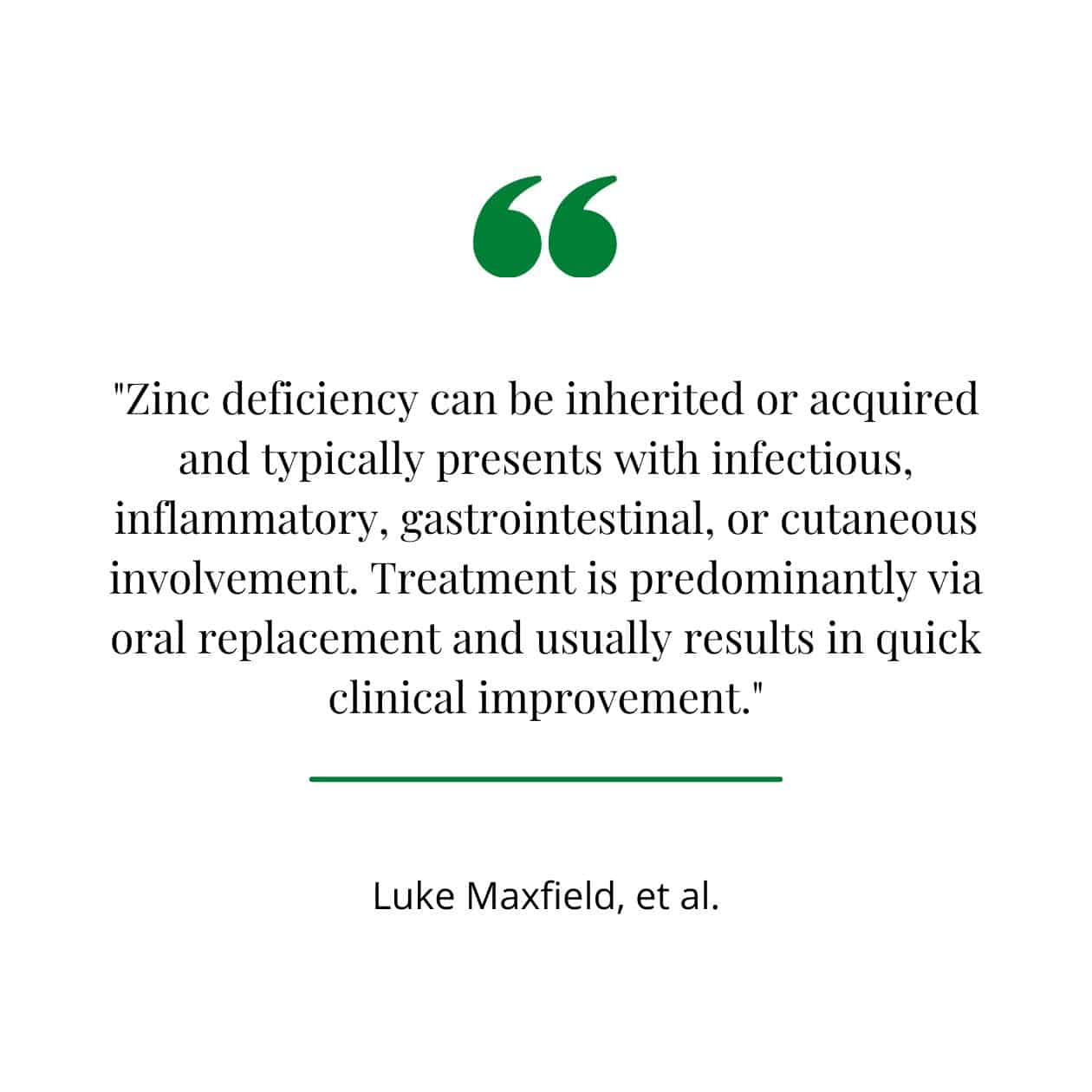
Image Source: Zinc Deficiency | National Library of Medicine
According to the National Institutes of Health (NIH), the following symptoms may be signs of a zinc deficiency [7]:
- Impaired immune function
- Loss of appetite
- Hair loss
- Chronic diarrhea
- Low libido
- Other sexual dysfunctions and reproductive system issues
- Eye and skin lesions
- Weight loss
- Slow-healing wounds
- Taste abnormalities
- Physical and mental lethargy
Also according to the NIH, those with limited caloric intake or digestive complications as well as those who drink alcohol every day are at most risk of being deficient in zinc. In addition, lack of exercise, chronic stress, and a poor diet, in general, can also play a major role in deficiency.
A 2013 Canadian study [8] found that marginal zinc deficiency may correlate to stress response dysregulation. Zinc has long been known to increase the production of BDNF (brain-derived neurotrophic factor), which you can think of as a kind of “nerve fertilizer” for the brain.
Can You Test for Zinc Deficiency?
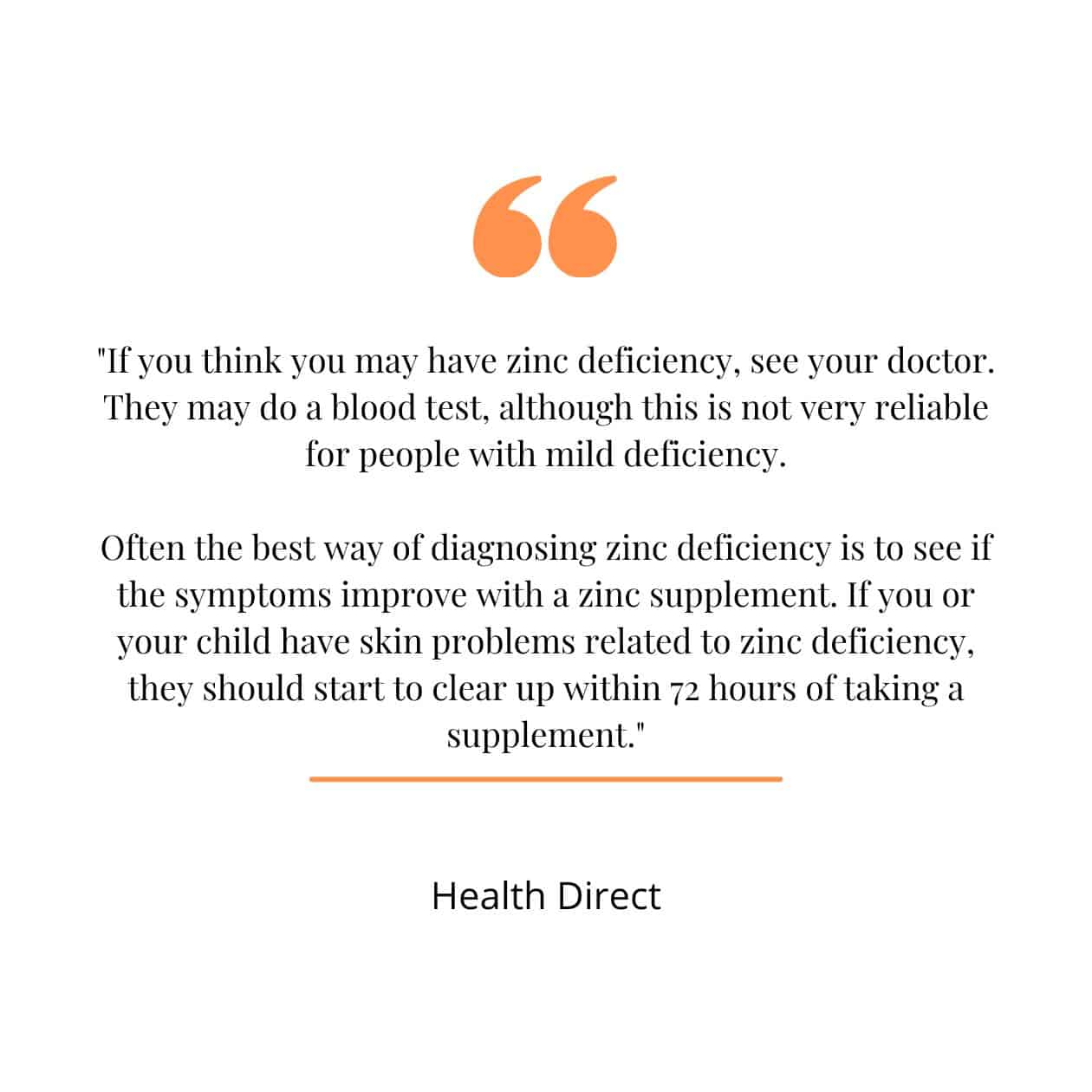
Image Source: Zinc Deficiency | Health Direct
It’s difficult to test for zinc deficiencies so often the best way is to see the signs, make changes to increase zinc in the diet through foods or supplementation, and see if symptoms improve.
The great news is that it’s easy to replenish your zinc supplies in your body by eating certain whole foods. Foods that are high in zinc include: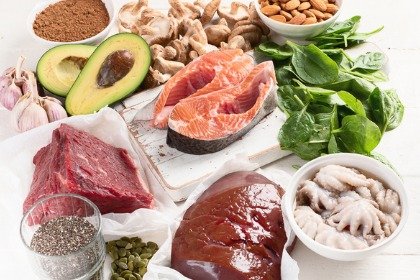
- Beans
- Nuts and like cashews, almonds, and pumpkin seeds
- Shellfish (especially oysters)
- Eggs
- Chicken
- Beef (make sure it is grass-fed and hormone-free)
- Liver
- Dark chocolate (great news for chocolate lovers!)
7 Types of Zinc Supplements
The U.S. Institute of Medicine [9] recommends 11 milligrams of zinc daily for adult men and 8 milligrams for adult women. If you feel that you still need more, zinc supplements are widely available.
There are actually seven different kinds of zinc supplements to choose from:
- Chelated Zinc
- Zinc Orotate
- Zinc Picolinate
- Zinc Gluconate
- Zinc Acetate
- Zinc Oxide
- Zinc Sulfate
Organixx Clean Sourced Collagens blend contains five types of collagen from four sources. What’s more, it’s combined with targeted nutrients such as zinc, vitamin C, and vitamin B6 which specifically enhance the bioavailability and potency of collagen. Clean Sourced Collagens is formulated from the ground up to enhance and support your body’s natural ability to heal and rebuild itself from the INSIDE out.



